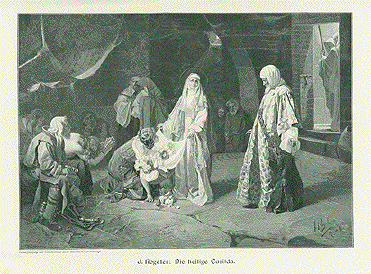The feast day of Saint Casilda of Toledo (approximately 950-1050) is celebrated today, April 9. While little is known about Saint Casilda, what we do know is inspirational—especially at a time when both inter and intra-religion conflicts continue to exist. The life of Saint Casilda reminds us that the Lord calls us to love and acceptance of all people, and challenges us to open our hearts to those we disagree with or do not understand.
Saint Casilda was born the daughter of a Muslim king in Toledo, Spain. Raised Muslim, she embraced her faith and felt a strong desire to help others—including the many Christian prisoners detained in Spanish prisons. In her kindness, against the orders of her father, Casilda often visited the prisoners, smuggling in food and bread for them in the folds of her dress. As holy legend recounts, on one occasion Casilda was stopped by prison guards who demanded she disclose what she was hiding in her clothing. Upon revealing the folds of her skirt, the bread she carried miraculously transformed into roses. Saint Casilda is oftentimes depicted in religious art carrying a basket or bunch of roses of this reason.
As a young woman, Saint Casilda fell ill, likely from a hemorrhagic fever common at the time, for which there was no cure. She refused the assistance of the best Muslim physicians, and instead, traveled down the Iberian Peninsula to the Shrine of San Vicente, known for it’s healing waters and miraculous cures. There, through her faith and holiness, she was cured of her illness, and later baptized into Christianity.
Saint Casilda lived the remainder of her life as an anchoress (until she reached the age of 100!) in quiet penance and solitude, contemplating the wonder of God, and praying for those on earth. She died peacefully, having served her creator well while practicing two faiths on earth.
Saint Casilda reminds us of the divides that exist between religions today (as well as within our own Church), and models for us the simple love and acceptance of others that the Lord calls us to. Rather than judge the imprisoned Christians, she brought them food. Rather than return to her family and argue with them about their faith, she chose to avoid the conflict, praying for them from afar. How often do we seek our arguments? How often do we judge members of our own and other faith communities? How might we better serve the Lord and draw others to Him through the practice of love, charity, and acceptance?
Day 99 of 365
Prayer Intentions: Acceptance and Love for all; An end to religion-based conflict.
Requested Intentions: Restoration of a marriage (J); For a friend’s daughter, seeking medical treatment for a blood disorder (D); For the grace and conversion of a loved one (Z); For a beloved son’s return to the faith (A); For the improved health and recovery of a mother (G); For health, blessings, and protection (K); For an improvement in a difficult employment situation (T); For a family member’s recovery from surgery (D); For the victims of an automobile accident (D); For peace of mind and health (J); For the love of a romantic partner (S).
Why pray the Rosary every day for a year?
Each time the Blessed Virgin has appeared-- whether it be to Saint Bernadette Soubirous at Lourdes; to Lucia, Jacinta, and Francisco at Fatima; or to Mariette Beco at Banneux-- she has asserted the importance, saving grace, and power of praying the Holy Rosary on a daily basis. Based upon her words, the Rosary is penance and conversion for sinners, a pathway to peace, an end to war, and a powerful act of faith in Jesus Christ. Pope Paul VI presented the Rosary as a powerful means to reach Christ "not merely with Mary but indeed, insofar as this is possible to us, in the same way as Mary, who is certainly the one who thought about Him more than anyone else has ever done."
To show us how this is done, perhaps no one has been more eloquent than the great Cardinal Newman, who wrote: "The great power of the Rosary consists in the fact that it translates the Creed into Prayer. Of course, the Creed is already in a certain sense a prayer and a great act of homage towards God, but the Rosary brings us to meditate again on the great truth of His life and death, and brings this truth close to our hearts. Even Christians, although they know God, usually fear rather than love Him. The strength of the Rosary lies in the particular manner in which it considers these mysteries, since all our thinking about Christ is intertwined with the thought of His Mother, in the relations between Mother and Son; the Holy Family is presented to us, the home in which God lived His infinite love."
As Mary said at Fatima, "Jesus wants to use you to make Me known and loved. He wishes to establish the devotion to My Immaculate Heart throughout the world. I promise salvation to whoever embraces it; these souls will be dear to God, like flowers put by Me to adorn his throne."

Subscribe to:
Post Comments (Atom)










0 comments:
Post a Comment
Thanks for leaving a comment. If you wish to submit a prayer request, however, please do so above, using the "Contact" tab.